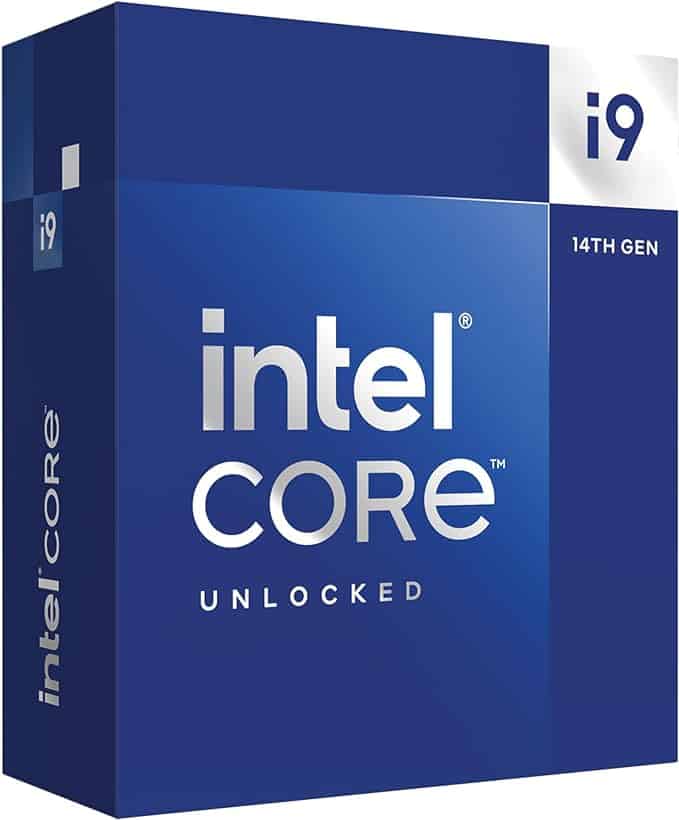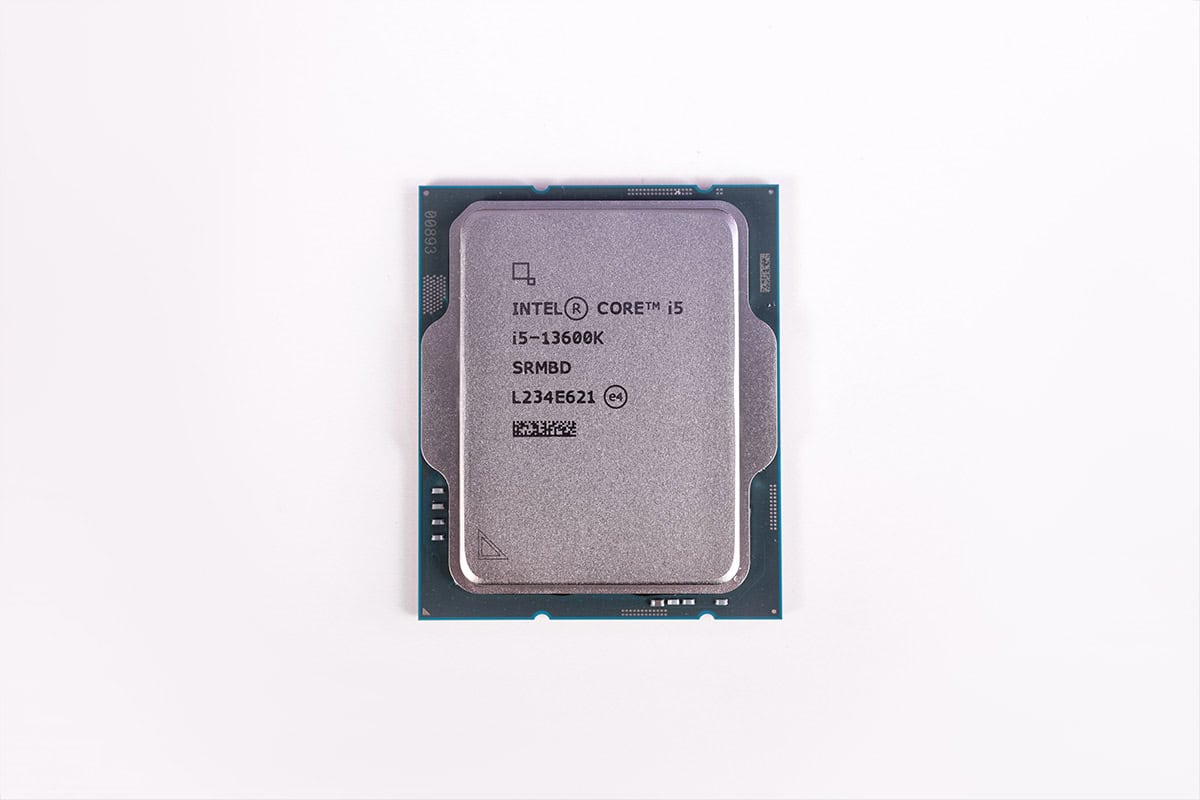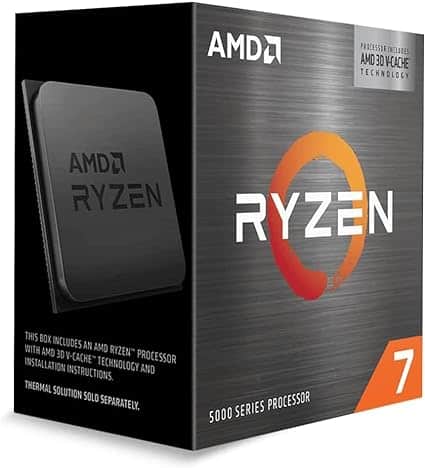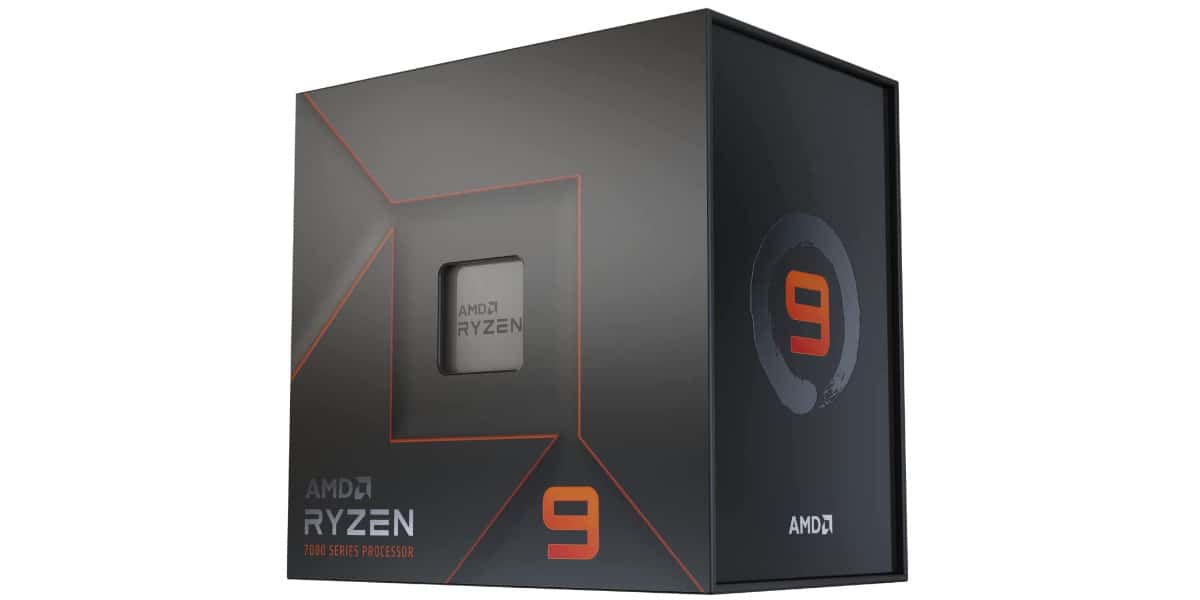AMD Ryzen 9 9950X vs Ryzen 7 7700X – Is Zen 5 better than Zen 4?

Table of Contents
AMD has decided to delay the 9950X release date by a couple of weeks, giving us even more time to compare the new to the old. Many changes have been made to the latest generation of Ryzen CPUs, probably the biggest of which is the core architecture upgrade from Zen 4 to Zen 5. This brings massive IPC improvements over Zen 4, which should make the 9000 series much more valuable in terms of performance.
That’s not to say that there’s no value in Zen 4 and the 7000 series, on the contrary. A new CPU generation usually brings more value to the previous generation as prices drop and people who seek to upgrade every other generation flock to the 7000 series from 5000 and below – remembering, of course, that a motherboard upgrade is required.
If AMD pushing back the 9000 series has got you in a pre-ordering mood, then you can take a look at our 9950X where-to-buy page. Here we list all of the retailers that we expect to be accepting pre-orders.
AMD Ryzen 9 9950X
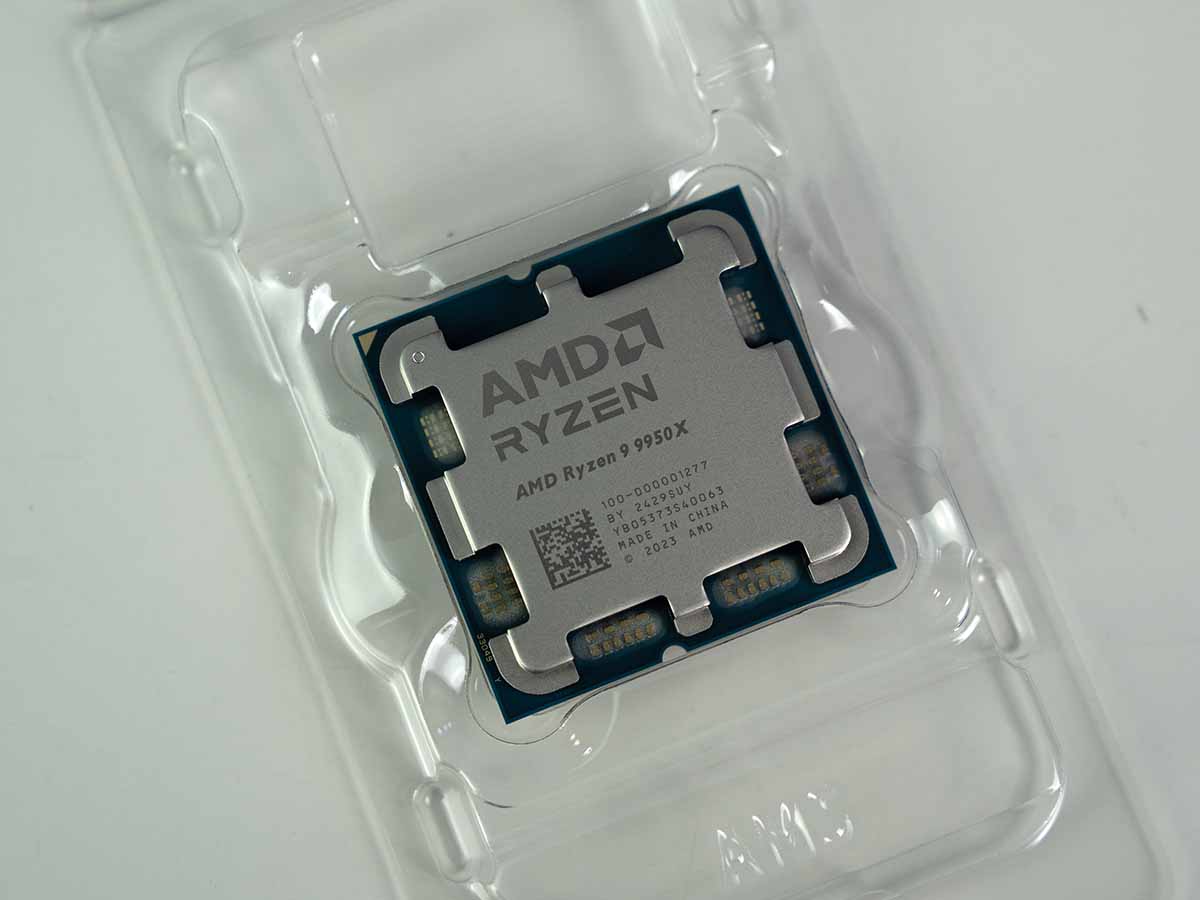
Cores
16
Threads
32
Boost clock speed
5.7 GHz
Base clock speed
4.3 GHz
L3 Cache
64 MB
TDP
170 W
Platform
AMD Socket AM5
Shop on Amazon
CHECK PRICEAMD Ryzen 7 7700X
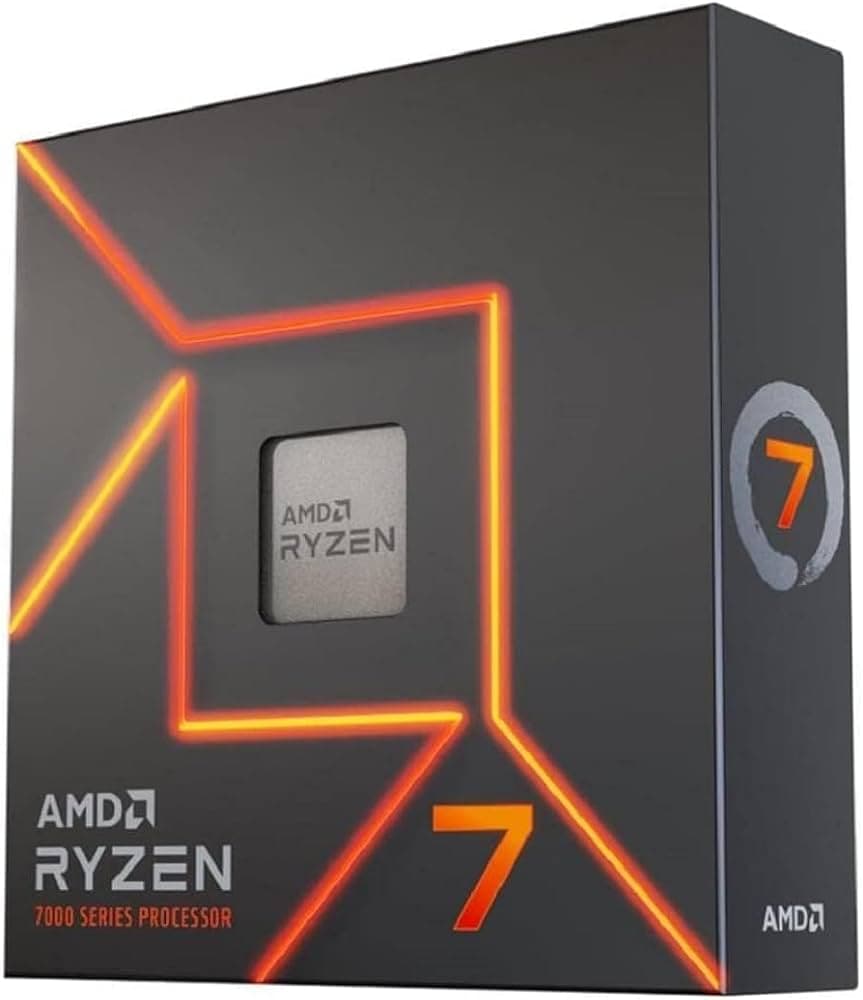
Cores
8
Threads
16
Boost clock speed
5.4 GHz
Base clock speed
4.5 GHz
L3 Cache
32 MB
TDP
105W
Platform
AMD Socket AM5
Shop on Amazon
CHECK PRICESpecifications
Obviously there are going to be quite a few differences here in terms of the CPU structure, this is because the chips we are comparing are completely different and targeted to different audiences. The main differences, however, come from the generational upgrade that Zen 5 brings.
| Specification | Ryzen 9 9950X | Ryzen 7 7700X |
|---|---|---|
| Cores | 16 | 8 |
| Threads | 32 | 16 |
| Base Clock | 4.3GHz | 4.5GHz |
| Boost Clock | up to 5.7GHz | up to 5.4GHz |
| L3 Cache | 64MB (shared) | 32MB (shared) |
| TDP | 170W | 105W |
| PPT | 230W | 242W |
| Socket | AM5 | AM5 |
| Core architecture | Zen 5 | Zen 4 |
On paper, it may seem like the 7700X has a slight edge in the low end in terms of single-core performance. And that would be right if it wasn’t for the IPC improvements that Zen 5 brings. We’ve mentioned this quite a lot and I promise we will get into it now.

Cores and threads
The 9950X has double the number of cores and threads as the 7700X so it’s a pretty safe bet to assume it has multi-core performance locked down, what isn’t as clear cut, however, is the single-core performance. AMD projects an IPC improvement of 16% for Zen 5 over Zen 4, this means that there are more instructions executed per cycle, but how?
Zen 5 is built on the 4nm manufacturing process, whereas Zen 4 is built upon the 5nm, process. This is one of those instances where smaller is better. The transistors inside Zen 5 cores are smaller, meaning more of them can be packed into the same footprint. Transistors are the collective logic gates that cumulatively execute instructions given by programs run on your computer.
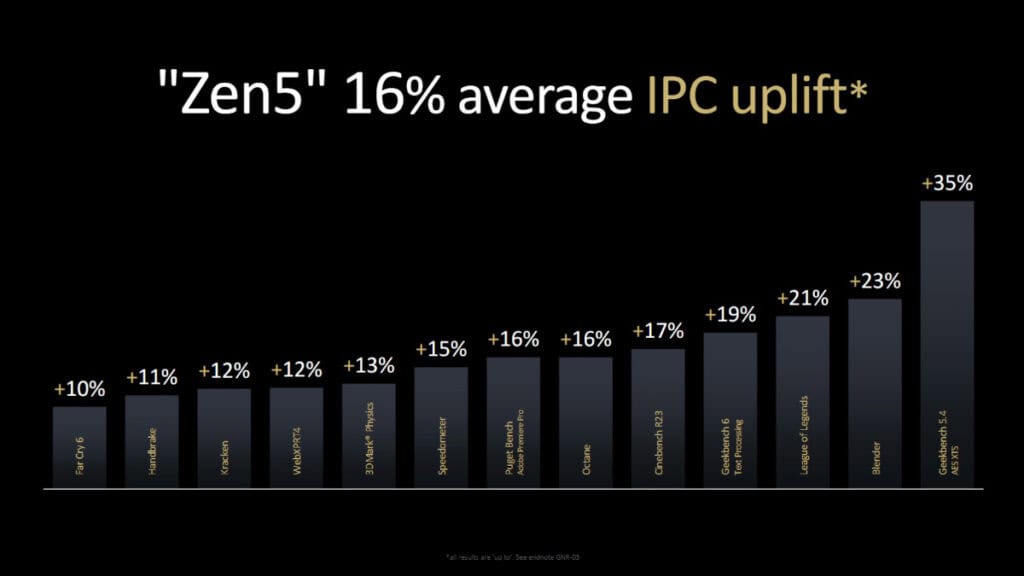
This means that the more transistors you have, the more powerful the CPU core is, and it makes each CPU cycle more valuable because of the processing potential.
Core speed
The CPU core speed is important for a couple of reasons, it represents the number of times per second that the CPU makes its way through the instruction cycle. (fetch, decode, and execute cycle). The more times it does this, the faster the CPU is at processing information.
This is also where IPC ties in, if the CPU has more transistors to process more instructions per cycle, and the CPU cycles more times per second, it’s a double-pronged attack on the previous generation. The 9950X isn’t technically faster in terms of core speed, as it has to be limited to save power consumption. However, we will have to wait to see what the XFR is when the processor is released.
Cache
The 9950X has twice the cache memory as the 7700X, which makes sense, given the fact that the Ryzen 9 has double the cores and threads. AMD also boasts double the cache bandwidth for Zen 5 processors, essentially meaning the cache has double the room for data, not in a storage capacity, but in a data flow capacity. This should help solve bottlenecking.
Cache exists for CPUs to pull from because fetching from system memory is far too slow these days. There are three levels of cache, each being larger (and slower) than the last. Level 3 is the largest.
TDP and PPT
TDP is the maximum amount of thermal energy a CPU can produce under normal operating conditions. The CPU with the lower TDP is generally best from a cooling and efficiency point of view, and that CPU is the 7700X. The 9950X has a TDP of 170W, making it much more thermally demanding.
What is interesting however is the PPT only being 12W off, 230 vs 242. PPT is the maximum amount of power that the motherboard will allow through the voltage rails to the CPU. Technically, this value being lower would make for a more efficient CPU. But you have to factor in performance to gain a performance per Watt factor.
9950X price predictions
We know that the 7700X can be found for around $280 if you know where to look. What isn’t as clear, however, is the retail price of the 9950X. Since AMD has not made any official announcements, we can only go off of historical data, and make an educated guess. Here are some of the RRPs of CPUs from previous generations:
- 7950X- $699
- 7900X – $549
- 7700X – $399
- 5700X – $299
- 5900X – $549
- 3900X – $499
- 14900K – $589
- 13900K – $589
- 14700K – $409
- 13700K – $409
Based on this, we would like to see the 9950X release at around $699 however there are some factors to consider. The world has gotten more expensive, in general. Manufacturing costs have increased, and so has the cost of living, this could have a knock-on effect, and we consumers might be the ones left making up the difference.
Graphical capabilities
Both of the CPUs here today have iGPUs installed on them. The integrated graphics on the Ryzen 7000 series was an RDNA 2-based 2 CU GPU capable of running CS:GO at 130FPS, according to WePC. The 9000 series is equipped with a 2 CU RDNA 3-based GPU with a variable 400 – 2,200MHz clock speed. It’s going to be interesting to see RDNA 2 vs RDNA 3 on this small package. Both CPUs offer more than enough graphical power to run day-to-day simple tasks.
How do these CPUs compare generationally?
We’ve gone over in hefty detail how the generational differences affect the chip’s performance, but what we haven’t discussed anything about the platform these CPUs sit on.
Both of these CPUs belong to the AM5 platform, meaning any motherboard with the AM5 socket will work with these CPUs. You get access to all of the features that AM5 has to offer using any of these CPUs. However, it’s safe to say that you will have a better experience if you wait to use the new Ryzen 90000 series CPUs on the upcoming X870 chipset. The new chipset offers vast improvements over the X670, such as more power phases, better connectivity, and more RGB, of course.
You may be asking yourself what happened to the 700 series of motherboards. We went from X670 to X870, I think that AMD did this so as to not appear behind Intel, and its upcoming 800 series motherboards.
Alternatives to the 9950X and the 7700X
We’d be a miss if we didn’t recommend the 14900K to you as an alternative to the new 9000 series, this is because recent benchmarks on Geekbench have revealed that the 14900K and the 9950X are very similar in terms of performance. If you’re on AM4 now and don’t fancy upgrading just now, you can always opt for the 5800X3D.
-
Intel Core i9-14900K
- Cores: 24 (8P-16E)
- Threads: 32
- Boost clock speed : P-Core 5.8GHz / E-Core 4.4GHz
- Base clock speed: P-Core 3.2GHz / E-Core 2.4GHz
- L3 Cache: 36 MB
- TDP: 253W
-
Intel Core i5-13600K
- Cores: 14 (6P-8E)
- Threads: 20
- Boost speed : P-Core 5.1GHz / E-Core 3.5GHz
- Base speed: P-Core 3.5GHz / E-Core 2.6GHz
- L3 Cache: 24MB
- TDP: 181W
-
AMD Ryzen 7 5800X3D
- Cores: 8
- Threads: 16
- Boost speed : Up to 4.5 GHz
- Base speed: 3.4 GHz
- L3 Cache: 96 MB
- TDP: 105W
-
AMD Ryzen 9 7900X
- Cores: 12
- Threads : 24
- Boost clock speed: 5.6 GHz
- Base clock speed: 4.7 GHz
- L3 Cache: 64 MB
- TDP: 170 W
What CPU is right for you?
Each of these processors is similar in terms of platform, but very different in terms of actual specifications and probably performance. The 9950X is much more powerful than the 7700X, in reality, these CPUs were never really designed to compete. It’s not yet known the performance per watt the 9950X holds, but we hazard a guess as to say it is greater than the 7700X. If that stands true, then the 9950X is technically the more efficient offering too, despite its higher TDP.
On the other hand, if you want to save some money and don’t need all of that performance, then the 7700X is still a fantastic processor. You would still be spending less money on your power bill if you opted for this CPU over the 9950X, you just wouldn’t be getting as much power out of it.
Both of the CPUs on offer today perform great within their areas, the 9950X is good for all-out performance, and the 7700X is great for those looking to save a buck or two. The 7700X was designed for the X670 and can still be used to its full potential on that chipset. Unless you need the features offered by the X870, there’s no real need to upgrade.



